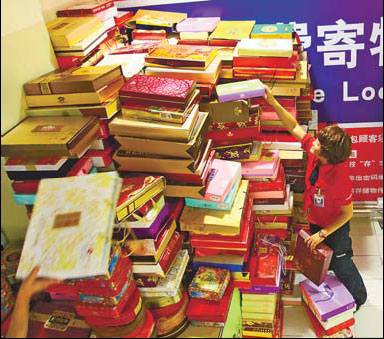Lawmakers restrict wasteful packaging
Updated: 2012-03-01 07:38
By Zhao Yinan (China Daily)
|
||||||||
BEIJING - Lawmakers passed an amendment to restrict excessive packaging and promote clean production on Wednesday.
The Amendment to the Law on the Promotion of Clean Production, which will take effect in July, makes companies responsible for avoiding excessive packaging and making sure that the "material, arrangement and cost" of the packaging are in line with the products.
Excessive packaging, which wastes resources and causes pollution, has been on the rise in China, and about 20 percent of trash in China is from discarded wrapping material, said Wang Guangtao, director of the National People's Congress' Environment and Resource Protection Committee.
 |
|
A worker organizes recycled moon cake packages at a supermarket in Jiashan, Zhejiang province, on Sept 19, a week after the Mid-Autumn Festival. [Hu Lingxiang / for China Daily] |
"Excessive packaging has raised wide concerns as the products are usually high-priced, especially food, so the practice infringes upon consumers' rights," he said.
Wang said he found cookies in Denmark, for example, may not be packaged in metal containers, a stark contrast with in China, but "a good way to avoid excessive packaging".
To increase the supervision, the amendment calls for local quality watchdogs to be responsible for checking whether companies might use excessive packaging.
However, the law does not give a clear definition of what constitutes excessive packaging.
Dong Jinshi, executive vice-president of the International Food Packaging Association, a Hong Kong-based nongovernment organization, said since the law is more a guideline on promoting clean production, it is "understandable" that it can hardly give explicit requirements on specific products.
"It is almost impossible to lay out specific requirements one by one, since there are just too many kinds of products," he said, adding that the State Council issued a regulation on packaging in April 2011.
The regulation exclusively requires that packages can be no more than three layers, and the cost of wrapping should be less than 20 percent of the value of the product.
Dong suggested producers label types and cost of their packaging, as they do with nutrition facts, to inform consumers and avoid lawsuits.
The Law on the Promotion of Clean Production, which took effect in 2003, aims to reduce waste and pollutants during production and to increase production efficiency.
Cao Yin contributed to this story.

 Relief reaches isolated village
Relief reaches isolated village
 Rainfall poses new threats to quake-hit region
Rainfall poses new threats to quake-hit region
 Funerals begin for Boston bombing victims
Funerals begin for Boston bombing victims
 Quake takeaway from China's Air Force
Quake takeaway from China's Air Force
 Obama celebrates young inventors at science fair
Obama celebrates young inventors at science fair
 Earth Day marked around the world
Earth Day marked around the world
 Volunteer team helping students find sense of normalcy
Volunteer team helping students find sense of normalcy
 Ethnic groups quick to join rescue efforts
Ethnic groups quick to join rescue efforts
Most Viewed
Editor's Picks

|

|

|

|

|

|
Today's Top News
Health new priority for quake zone
Xi meets US top military officer
Japan's boats driven out of Diaoyu
China mulls online shopping legislation
Bird flu death toll rises to 22
Putin appoints new ambassador to China
Japanese ships blocked from Diaoyu Islands
Inspired by Guan, more Chinese pick up golf
US Weekly

|

|






